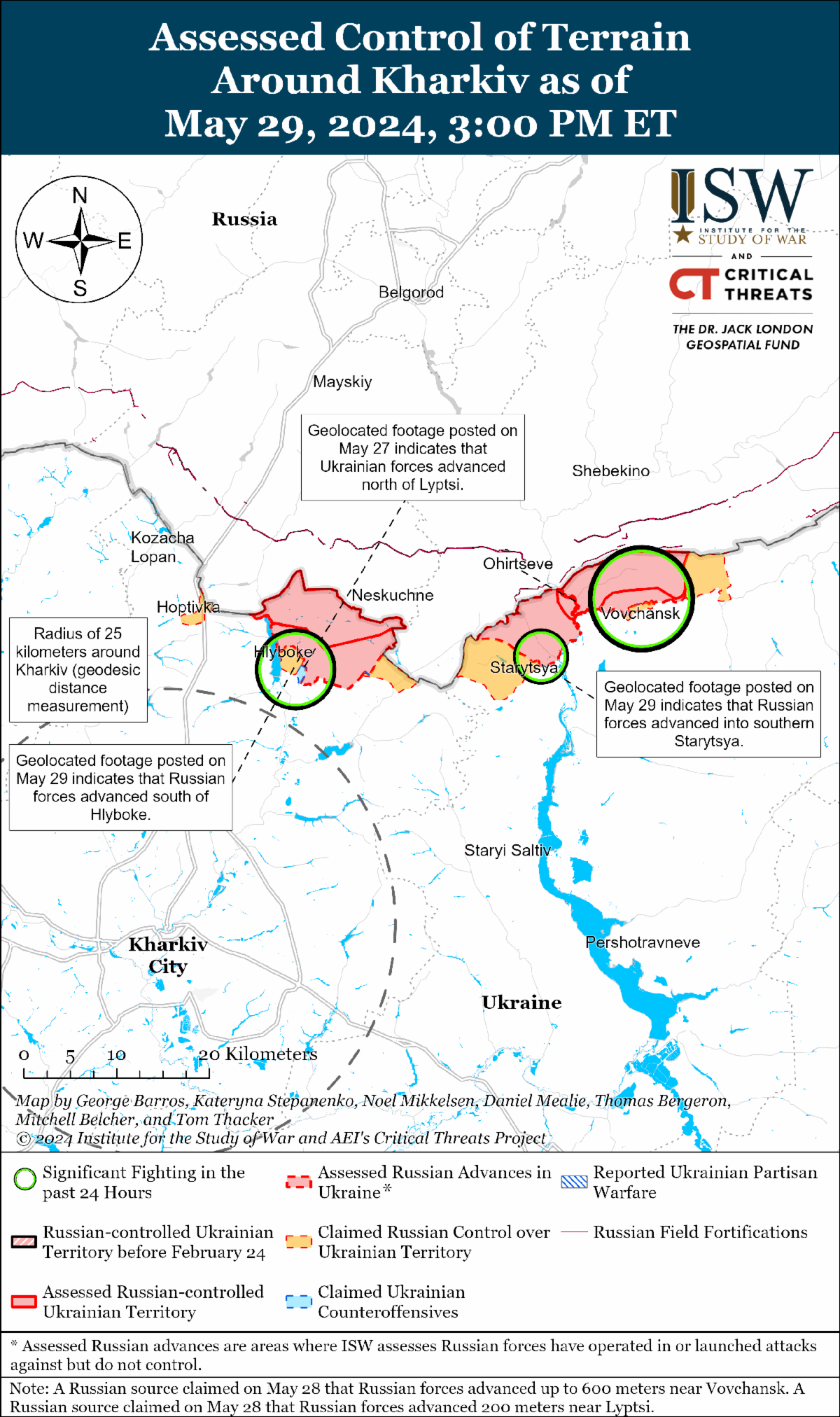Advisor to the Head of the Ukrainian President's Office Mykhaylo Podolyak stated that US-provided military aid has started arriving on the frontline but that it will take "weeks" for the gradual increase in US-provided military aid to reach "critical volumes." Podolyak told Bloomberg in an article published on May 29 that Russian forces currently have the "absolute advantage" in shells and missiles and that Russian forces will continue to try to advance along the frontline presumably to take advantage of the time before US military assistance arrives in sufficient quantities at the front. Podolyak warned that Russia may be trying to force Ukraine and its allies to freeze the current frontline — a situation that ISW has long assessed would be advantageous to Russia by giving the Russian military time to reconstitute and prepare for renewed aggression against Ukraine. Additional Western military assistance will also likely take time to reach the frontlines and to be properly integrated into Ukrainian frontline troop formations. Czech Prime Minister Petr Fiala stated on May 28 that the first "tens of thousands" of 155mm artillery ammunition sourced through the Czech-led initiative for Ukraine will arrive in Ukraine within "days."
Sweden announced its 16th and largest military aid package to Ukraine, worth 13.3 billion kronor (about $1.25 billion), on May 29. The Swedish Ministry of Defense (MoD) reported that the package includes ASC 890 Airborne Surveillance and Control aircraft (the Swedish version of an airborne early warning and control [AWACS] airborne radar system) and RB 99-AMRAAM medium-range air-to-air missiles (that are also modified to be ground-to-air) to strengthen Ukrainian air defense capabilities, additional 155mm artillery ammunition, and "the entire Swedish stock" of Pansarbandvagn 302 armored vehicles among other provisions.
Western officials are increasingly suggesting that they support Ukraine's right to use Western-provided weapons to strike military targets in Russia. French President Emmanuel Macron stated on May 28 at a joint press conference with German Chancellor Olaf Scholz that France supports Ukraine's use of French-provided weapons to strike Russian "military sites from which missiles are fired" and other Russian "military sites from which Ukraine is attacked" in Russian territory. Macron noted that Ukraine should not strike "other military" or civilian targets in Russia, likely referring to Russian sites that are not actively involved in attacks on Ukraine. Scholz stated at the May 28 press conference that Germany recognizes Ukraine's right to defend itself against Russian strikes under international law as long as "regulations" on Ukraine's use of Western-provided weapons are "within the framework of international law." Scholz's recognition of Ukraine's right to strike military targets on Russian territory is notable as it defines the issue in terms of international legal norms but ultimately does not reflect a change in Germany's position against providing Ukraine with long-range Taurus missiles or allowing Ukraine to strike military targets in Russia with German-provided weapons.
Key Takeaways:
- Advisor to the Head of the Ukrainian President's Office Mykhaylo Podolyak stated that US-provided military aid has started arriving on the frontline but that it will take "weeks" for the gradual increase in US-provided military aid to reach "critical volumes.
- Sweden announced its 16th and largest military aid package to Ukraine, worth 13.3 billion kronor (about $1.25 billion), on May 29.
- Western officials are increasingly suggesting that they support Ukraine's right to use Western-provided weapons to strike military targets in Russia.
- Russian President Vladimir Putin appointed Russian Presidential Aide Alexei Dyumin as Secretary of Russia's State Council on May 29.
- Russia blamed Ukraine for the recent several-month-long suspension of prisoner of war (POW) exchanges over the backdrop of reports of pervasive Russian abuses against Ukrainian POWs.
- Russian President Vladimir Putin continues his efforts to prepare the Russian population for a protracted war effort.
- Belarus suspended its participation in the Cold War-era Conventional Armed Forces (CFE) in Europe Treaty on May 28.
- Russian forces recently advanced north and northeast of Kharkiv City, near Kreminna, Chasiv Yar, and Avdiivka.
- Russia continues efforts to expand social benefits for Russian military personnel, veterans of the war in Ukraine, and their families.
| 





 [ISW] 이스라엘-하마스 전쟁(이란) 업데이트, 2024년 5월 29일
[ISW] 이스라엘-하마스 전쟁(이란) 업데이트, 2024년 5월 29일
 [국방부] 시민들과 함께 전쟁사 따라잡기!
[국방부] 시민들과 함께 전쟁사 따라잡기!